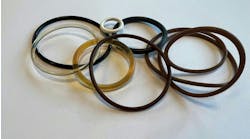The Hurtte File
Frank Hurtte
Age: 50
Company: Van Meter Industrial, 13 locations in Iowa
Title: VP Technology
Background: BS, computer engineering University of Illinois; Joined Allen-Bradley as an engineer trainee in 1977. Joined Van Meter Electric Supply as branch manager and VP of high tech sales in 1991. Assumed purely strategic role of VP Technology in 2000.
Would like to share a cup of coffee with: "Andrew Jackson is a long-term hero of mine. He grew up an orphan in poverty and through his own hard work and fearless nature became President. I have a whole bunch of questions about self discipline, controlled rage, and strength I would like to run past old Andy Jackson."
Growing up in the oil distribution business, Frank Hurtte knew as a young teenager that he wanted to do something technical and exciting. Working his way through college selling encyclopedias, he earned a degree in computer engineering. Sometime in his junior year of college, he heard the term "sales engineer," and decided it would be the best of both worlds.
Hurtte's employer, Van Meter Industrial, is an employee-owned electrical wholesale business. They sell a full line of automation products, control valves, motion control, and process instrumentation. A decade ago, the company decided to invest in the systems side of the business, to compete with the e-commerce suppliers popping up. Van Meter now spends more than three times the national average on its high tech infrastructure.
Hurtte helps his customers compete in a world market by bringing new ideas and new technologies to their business. The company recently sponsored an RFID forum for manufacturers in Iowa and surrounding states. They gathered six experts from around the country and asked for an overview of the state of the RFID industry. In the future, Van Meter plans to sponsor another seminar outlining the latest food and drug regulations.
Industry trends
Hurtte notes that in the past, compensation came through gross margin in selling boxes full of technology: PLCs, drives, sensors, etc. Today, his company is moving to a model that requires them to charge for some services. In the past, sales engineers had assisted in the selection and setup of sensors. They took several hours to simulate the customer's environment and experimented with various products. This type of service made sense when sensors cost $1,000. In some instances, a sensor with the same capabilities today could cost $150 or less.
Additionally, motion control is moving into many nontraditional industries. Notes Hurtte, "Our market is experiencing much growth in what I term lean manufacturing-driven motion. The motion control systems are being used to change machine stops, to do automatic setup that used to be done by a maintenance person, and to replace mechanical systems that lack future flexibility."


